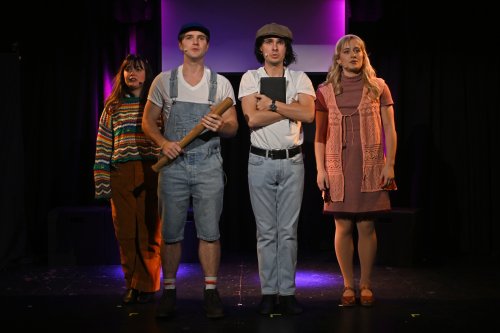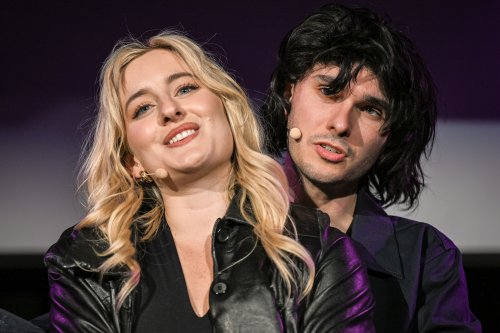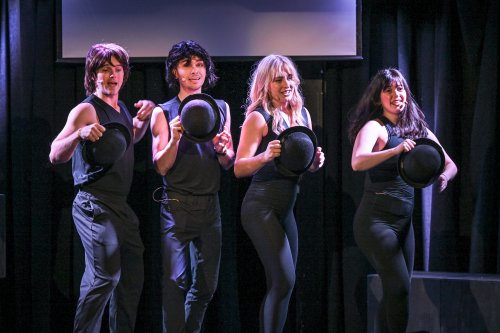Honeyland
A coming-of-age musical set in 1960’s Boston that follows a group of four college graduates.

Abby Goldberg, Ben James Tyrrell, Jacob Higdon and Anika Buchanan in a scene from the new musical “Honeyland” at The Triad Theater (Photo credit: Thomas Mundell, Mundell Modern Pixels)
Political revolutions are considered violent, chaotic events that bring about radical change. Armed groups act against what they consider illegitimate political structures, usually governments, often controlled by a dictator or oligarchic group. What happened in the United States in the late 1950’s into the early 1970’s was a revolution of a different type. It was a social revolution with political overtones. The civil rights movement was at its most vocal and politically engaged level. The Vietnam War motivated hundreds of thousands of young adults to take public action in opposition to the war. Women were taking action against the patriarchal socio-economic structures that considered them to be inferior to men. It was a tumultuous time to be coming of age.
Honeyland is a coming-of-age musical with music and lyrics by Clarry Evans and book and lyrics by Denny Lawrence, who also directs the show. Set in 1960’s Boston, it follows a group of four college graduates who have become activists in the period’s movements as they navigate some of its defining events.
Three of the four cast members and two of the off-stage members are making their Off-Broadway debuts, and they all give solid performances, even the two off-stage voices. Anika Buchanan fully embodies Helen the love interest of Mike and later his wife. Jacob Higdon gives an excellent portrayal of Tom as an introspective, somewhat emotionally remote man who becomes a writer. Ben James Tyrrell brings his character to life as an emotionally complicated, creative actor who ends up in Vietnam. Tyrrell also gives two solid performances of songs he accompanies himself on with an acoustic guitar. Abby Goldberg as Fran, returning to the Off-Broadway stage, gives the strongest and most believable characterization. She effectively and convincingly becomes her character in the scenes depicting the various stages of the character’s growth. Noah Marcus and Kelsey Marshall are the understudies who do not appear on stage but whose voices, used at various points in the show, fit in without revealing it is not the voices of the on-stage cast.

Anika Buchanan and Jacob Higdon in a in a scene from the new musical “Honeyland” at The Triad Theater (Photo credit: Thomas Mundell, Mundell Modern Pixels)
The story weaves together the group’s history with flashbacks to their childhood, high school years, and a time immediately after college. It is a show that tries to cover too much territory without getting a solid handle on any of it. There are two potential dramatic threads, either of which would provide a strong story arc if developed as the heart of the story. One is the Vietnam War’s social, political, and personal impact on the group members, and the other is the interpersonal romantic relationships within the group. These two themes are the strongest in the show but lack the depth to explore the dramatic possibilities fully.
The two strongest songs in the show are the opening number and closing piece. The opening number, “Jungle Green,” is sung by Tyrrell as Mike. He is in military garb, covered by a poncho, carrying an M16 rifle. He is in the jungle of Viet Nam, singing about the absurdity of his situation. It is an intense song, solidly sung. It would be a strong opening for a story based on the war. What it turns out to represent will have to wait until the end of the play.
The closing song, “We Need To Believe,” is also solid. It would provide a strong coda to the play if the play was structured differently. It is sung by Helen (Buchanan), Fran (Goldberg), and Tom (Higdon). This song reflects on the experiences that led them to this particular moment. It is a good song, but it does not fit the timeline. The ideas presented in the number would be appropriate for people coming to an understanding of things that happened a decade or more in the past, not something from the immediate past.

Ben James Tyrrell, Jacob Higdon, Anika Buchanan and Abby Goldberg in a scene from the new musical “Honeyland” at The Triad Theater (Photo credit: Thomas Mundell, Mundell Modern Pixels)
Honeyland is a showcase presentation in a small venue with limited production values regarding sets and costumes. The songs are integrated into the story, with the generally fine vocals marred by the use of wireless microphones and inconsistent sound management detracting from their overall impact. The location of the excellent band, directed by Clare Cooper, between the stage and the audience, may be why the actors are using microphones since the music volume would overwhelm the voices of the actors without them.
The lighting design by Ben Hostetler, who also does sound design, could be more balanced in defining the scenes and guiding the story. This issue may also be a function of the venue and the limitations of the stage. Molly Goldberg’s costume design needs to be more consistent and work for the depicted period. The publicity photos show what appear to be hippie-type outfits worn by some young people in the mid to late 1960s. Still, those costumes are not evidenced in the staging. The choreography by Michelle Lemon is limited but works effectively within the limitations of the stage.
The show is worth seeing for the people interested in discovering actors who will someday “tread the boards” of a Broadway theater. It is also worth experiencing what a musical is like when it is still in development.
Honeyland (through November 2, 2024)
Theatreroo Productions
The Triad Theater, 158 West 72nd Street, in Manhattan.
For tickets, visit http://www.honeylandthemusical.com
Running time: 80 minutes, not including an intermission





Leave a comment